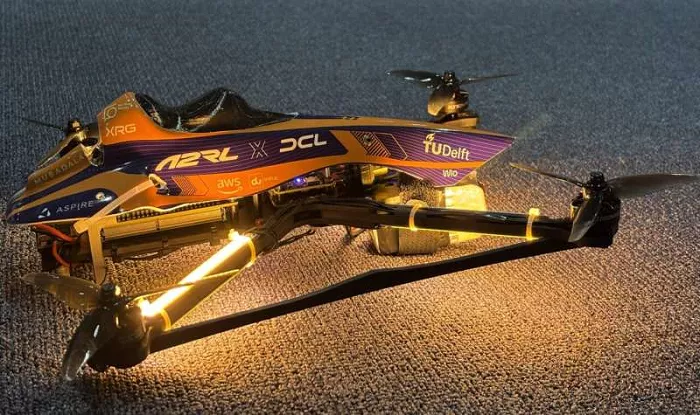For the first time, an artificial intelligence-powered drone has defeated human pilots in an international drone racing competition, marking a significant step forward in the development of AI. On April 14, 2025, two drone racing events took place simultaneously: The Falcon Cup Finals for human pilots and the A2RL Drone Championship for autonomous drones.
The highlight of the day saw the best AI drones compete against top human pilots. A drone developed by Delft University of Technology won both the A2RL Grand Challenge and the knockout tournament, beating three former world champions in the Drone Champions League (DCL). The AI drone reached speeds of 95.8 km/h while navigating a challenging, winding track.
The Delft University team of scientists and students achieved this feat by developing a highly efficient AI system that allowed the drone to make split-second, high-performance decisions. While previous AI victories, like those in chess or Go, occurred in virtual settings, this achievement took place in the real world.
Two years earlier, the University of Zurich’s Robotics and Perception Group made headlines by defeating human drone champions with an autonomous drone, but that event took place in a controlled lab environment. In contrast, the 2025 A2RL competition in Abu Dhabi featured real-world challenges, with the track and hardware designed by the competition organizers.
Advancing Physical AI
The goal of the 2025 A2RL Drone Championship was to push the boundaries of physical AI by encouraging research on robotic AI under extreme time pressure and limited resources. The winning drone was equipped with just one forward-facing camera, much like human FPV (first-person view) pilots, adding perception challenges for the AI.
The AI that triumphed in the competition was developed by the MAVLab team at Delft’s Faculty of Aerospace Engineering, led by Christophe De Wagter. The AI used a deep neural network that controlled the drone’s motors directly, without relying on a traditional human controller. This approach was inspired by research at the European Space Agency (ESA), which found that deep neural networks could mimic traditional algorithms but require much less processing power.
“We trained the neural networks using reinforcement learning, which means the drone learns by trial and error,” De Wagter explained. “This allowed us to push the drone closer to its physical limits.”
AI for the Future of Robotics
The AI developed for this drone racing competition is not just for racing—it has broader applications for autonomous robots. The efficient AI could improve robots used in areas such as emergency response, delivery systems, and self-driving cars.
“Flying drones faster is important for many real-world applications,” De Wagter said. “From delivering medical supplies to finding people in disaster zones, the techniques developed for drone racing can help optimize other robots for energy, safety, and efficiency.”


